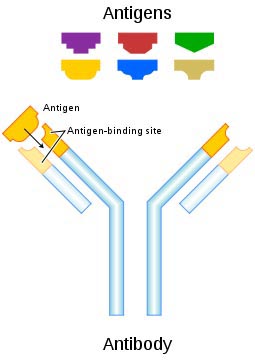 | ||||
Immunology: Acquired Immunity
Practice Test Questions
Virtual Microbiology Classroom of Science Prof Online
Review questions to help students better understand acquired immunity.
Immunology: Acquired Immunity Test Qus
SPO VIRTUAL CLASSROOMS
 | ||||||
1. Which of the following best describes the difference in how B cells and cytotoxic T cells respond to invaders?
a. B cells confer active immunity; cytotoxic confer passive immunity.
b. B cells kill viruses directly; cytotoxic T cells kill virus infected cells.
c. B cells remember pathogens and produce antibodies; cytotoxic T cells directly kill cells that are infected with pathogens.
d. T cells remember pathogens and produce antibodies; cytotoxic B cells directly kill cells that are infected with pathogens.
2. Antibiodies function...
a. to directly destroy foreign organ grafts
b. to mark invading organisms for destruction
c. to kill intracellular viruses
d. in nonspecific immune defense
3. B cell receptors are...
a. antigens that mark B cells as "self"
b. antibodies embedded in the B cell plasma membrane
c. the same for all B cells
d. antigens embedded in the B cell plasma membrane
e. chemicals that help the B cell directly kill invading or abnormal cells
4. The cell-mediated immune response involves...
a. NK cells b. erythrocytes c. Memory cells
d. T cells e. Plasma cells
5. The Major Histocompatibility Complex is a ...
a. set of genes
b. set of proteins
c. antigen presenting cell
d. antigenic determinant
The following questions, from the Virtual Microbiology Classrooms (8-week & 16-week), are designed to help students better understand this topic. All questions are based on material that can be found on the Immunology: Acquired Immunity Main Page.
You have free access to a large collection of materials used in a college-level introductory microbiology course. The Virtual Microbiology Classroom provides a wide range of free educational resources including PowerPoint Lectures, Study Guides, Review Questions and Practice Test Questions.
Page last updated: 2/2016
SCIENCE VIDEOS
These multiple choice and true/false questions are designed to help students practice and test their understanding of this topic.
6. Can an undifferentiated B cell be activated to produce antibodies without the involvement of a T cell?
a. yes b. no
7. A macrophage helps defend the body against pathogens by:
8. Rejection of a foreign skin graft is an example of...
a. a cell-mediated immune response
b. antibody-mediated immunity
c. tolerance
d. destruction of virus-infected cells
e. a second-line immune response
9. MHC Class 2 molecules bind to ______ and trigger _____.
a. endogenous antigens, cytotoxic T cells
b. exogenous antigens, cytotoxic T cells
c. antibodies, B cells
d. endogenous antigens, helper T cells
e. exogenous antigens, helper T cells
10. Secretion of antibodies by activated B cells is a form of cell-mediated immunity.
a. True b. False
Click here for practice questions on Immunology - Innate Immunity.






